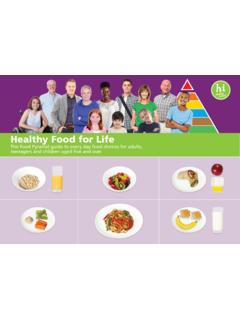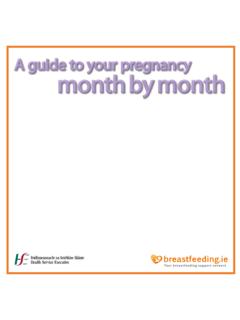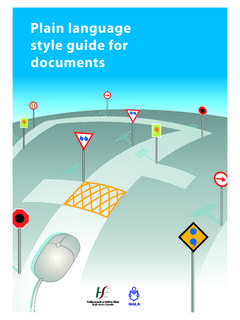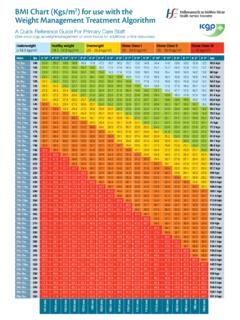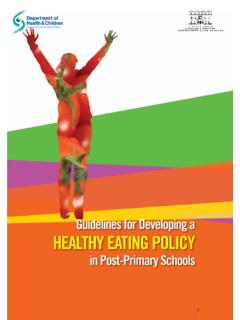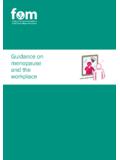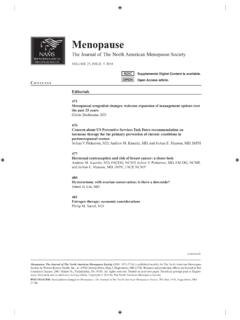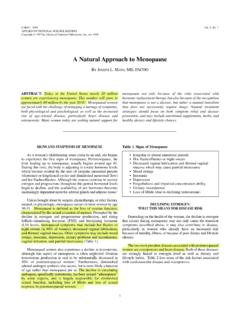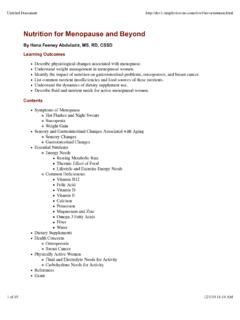Transcription of Menopause - Health Promotion
1 MenopauseA GuidePublished by: The Women s Health Council and Health Service ExecutivePublication date: July 2008 Review date: July 2011 Order code: HPM00069 Further copies can be ordered from: Health Service Executive Local Health Promotion DepartmentsHSE Infoline 1850 24 1850 or GuideJuly 1 What is the Menopause ?.. When does the Menopause happen?.. How do I know if I m menopausal? .. Can I get pregnant during the Menopause ?.. What to expect from your doctor ..Section 2 Symptoms of the Menopause .. How the Menopause affects your body .. How the Menopause affects your mind.
2 Section 3 Managing your Menopause .. Get active and eat healthily .. How does physical activity help?.. Looking after your bones .. Managing your other symptoms ..Contents5791011111314182122262831 Section 4 Hormone replacement therapy (HRT).. What is HRT? .. How do I take HRT? .. How long should I take HRT for? .. Relief of symptoms .. Side effects of HRT .. Risks of HRT ..Section 5 Complementary and alternative Questions you should ask your therapist ..More information and useful contacts ..33343535363636394142 Menopause is a normal event in a woman s life.
3 The years before may have been taken up with rearing your family, building relationships and your career. Around the time of the Menopause many people, men and women, are beginning a new stage of their lives. Your relationships with your partner, parents, children or close friends change as they too become older. Your attitude to work may change; you may look for new challenges or feel you want to slow things with the symptoms of the Menopause , it is hardly surprising that some women fi nd this time diffi cult. However, there are also positive aspects to life after the Menopause . Periods will no longer be an issue and you won t have to think about pregnancy.
4 While the Menopause signals the end of your childbearing years, it is also the start of a new phase of your life. This booklet has been developed by the Women s Health Council and the Health Service Executive. It includes information on: what the Menopause is and why you experience the Menopause ; symptoms of the Menopause ; how to manage these symptoms; and how to look after your Health after the Menopause . It may not answer all your questions, but we hope it will be a useful guide. You should talk to your doctor about any questions or problems you may 1 What is the Menopause ?7 Medically speaking, Menopause means your periods have stopped for one year.
5 However, most women use the word in a wider sense to mean the years before and just after Menopause . The Menopause is a natural part of your life. It marks the end of your fertility that is your ability to get pregnant and have puberty (usually in your early teenage years) you began to have monthly hormonal cycles that resulted in your periods. This is called the menstrual cycle. During the early part of each cycle the levels of the hormone oestrogen rise, stimulating the growth of an egg in your ovaries. At ovulation an egg is released from one of your two ovaries. Then another hormone, progesterone, stimulates the lining of the uterus to thicken.
6 If the egg is not fertilised by a sperm, your hormone levels drop and the lining is shed as a you get older, you ovulate less often, which is why your fertility level goes down with age. As you approach the Menopause , you may not always ovulate and the release of oestrogen and progesterone can become irregular. Your ovaries gradually become less active and you produce much less oestrogen. Eventually the ovary stops functioning and you release no more eggs. The release of oestrogen and progesterone also virtually stops. These changing hormone levels are the reason for many of the symptoms of the Menopause .
7 If your hormone levels reduce slowly, you may only realise you have reached the Menopause when your periods is the Menopause ?8 MENOPAUSE9 When does the Menopause happen?The Menopause can start at any time from your late 30s to late 50s. For most women it happens between age 48 and 55. A natural Menopause between the ages of 40 and 45 is called an early Menopause . A natural Menopause before the age of 40 is considered a premature Menopause . Premature Menopause can be a particularly diffi cult experience. If this happens to you, you should talk to your doctor about having special tests to fi nd out the some women, the Menopause may be caused by cancer treatments such as chemotherapy or radiotherapy, or by having ovaries removed during a hysterectomy (womb surgically removed).
8 This sudden stop in the production of hormones may lead to symptoms. These may be another complication of an already traumatic illness. 1 For more information on premature Menopause , see The Daisy Network, a premature Menopause support group in the UK, do I know if I m menopausal?If you are in your mid to late 40s and you have some of the following symptoms you may be women go through this stage of their lives without any problems. For those who do have problems, each woman s experience may be different. Use the information in this booklet as a guide. It may help to speak with your doctor or a friend who has been through the may start to experience some symptoms up to two years before your periods stop.
9 You may experience a few days or weeks of symptoms followed by weeks when none occur. After your last period you may continue to have symptoms for a number of years. It is not unusual for some women to have occasional symptoms into their 60s and sometimes 70s. If your symptoms cause you distress, talk to your doctor. They will give you advice on managing your symptoms and may discuss medical treatments such as HRT hormone replacement therapy (see p. 33). Some women use complementary or alternative therapies to relieve their symptoms (see p. 39).Physical Irregular periods Hot fl ushes Night sweats Heart palpitations Decreased libido (sex drive) Psychological Mood swings Irritability Increasing anxiety Insomnia Poor sleep pattern Diffi culty concentrating ForgetfulnessCan I get pregnant during the Menopause ?
10 During the Menopause it can be diffi cult to know when you are ovulating, especially if your periods are irregular. You can get pregnant around this you don t want to become pregnant, you should use contraception until you have not had a period or any bleeding for: two years if you are aged under 50, or one year if you are aged 50 or to your doctor or family planning clinic about what contraception to you visit your doctor to discuss the Menopause you can expect to: talk about your medical history when you had your last period, what symptoms you are experiencing, what contraception you use, any other conditions you have and medication you take and your family history of certain diseases such as breast cancer; talk about how your Menopause symptoms are affecting you; discuss your options such as lifestyle changes, HRT and complementary therapies; discuss other Health issues, such as osteoporosis and heart disease, as well as breast and cervical screening.

